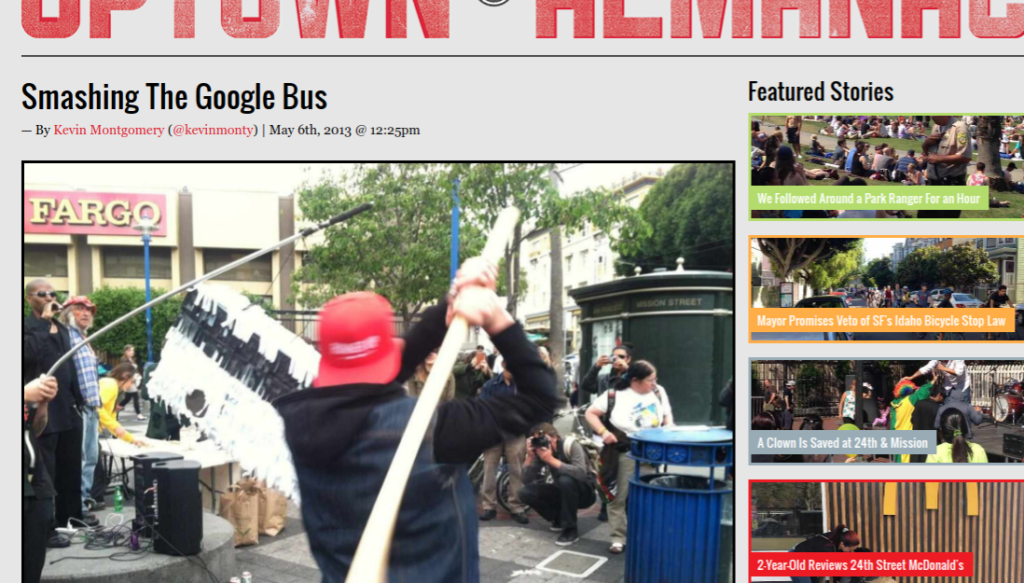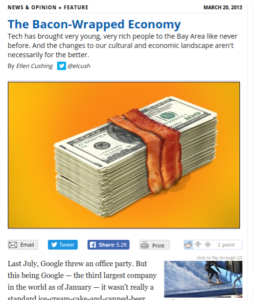“The only acupuncturists or herbalists I know who can make it here have a tech worker spouse who supports them.”
We were standing on Jackson St. in Oakland when our friend N. told us he was leaving. He’d graduated from Chinese medicine school last year, and the numbers just didn’t work out. Student loans, cost of living, the challenge of establishing a practice.
Even with a thousand Facebook friends and incredible goodwill from the community, who’d Liked and Tweeted and Yelp’d him like crazy, there just wasn’t enough money in the work he loved. So one of the gentlest, most healing spirits we know is leaving SF. If you take what he said and substitute “artist”, “performer”, “midwife”, “corsetmaker” or “playwright” you get the reality of our community, the uniquely Bay Area intersection of art and tech: you can afford one creative per couple here.
To have a middle class life in SF, you need at least one tech income.
To buy a house or have a child, you need two. It’s maddening, frightening, depressing. People are freaking out about it. How do we make peace with it, especially when people in the tech industry fan the flames of SF’s hatred for them by doing things like this?
His usual smooth ride on a Bay Area Rapid Transit train was derailed by the system’s first strike in 16 years. So Phillips drove from the East Bay city of Concord to Oakland. He stood in a “quarter-mile-long” line for a ferry. Then he gave up and jumped on his own boat, a 30-foot Bayliner named Lovin’ Life.
We resent tech money because we don’t like our arriviste to consume conspicuously unless they’re doing it for our entertainment. We don’t consider “coder” a job title that merits celebrity or wealth. We want our self-made men to make their millions with something we can grasp, like real estate.
People went crazy about Sean Parker’s wedding because Sean Parker engaged in a huge public dialogue about it.
He tried to get America to sign off on it, to dig the theatricality of his narcissistic flourish of wealth. But we grant wealth to athletes and Kardashians voluntarily, by making them celebrities. Nobody agreed that Sean Parker gets to be a billionaire; America didn’t sign up for this guy to get rich off us. Well, except in the signing up for accounts on social networks he created sense.
In the Bay Area, our American dislike and suspicion of eggheads has become oddly conflated with our finger-wagging at bullies and greed.
This TechCrunch article has a good take on the question of why San Francisco hates tech money so much:
These poignant words from Salon’s founder say it all about the transition from geeks to brogrammers that began in the first boom:
The first boom raised rents and drove working artists out of the city. At the same time its tech workers experienced a fin de siècle delirium of overwork, overspending and overdreaming.
The heady quality of those days was mostly predicated on dreams of making e-commerce fortunes, not Web 2.0 notions of social change through platform. People thought they could get rich selling shit, plain and simple. Families and working creatives were displaced from their homes by twentysomethings who worked for Pets.com.
So even for those of us who were directly dispossessed by it, who lost our jobs and had displaced friends sleeping on our couches, the first dotcom bust had a sweet taste of vindication.
When those million-dollar lofts were standing empty in SoMa, it seemed like just desserts for dbag developers. We didn’t deliberate about whether they’d ever be filled. As it turned out, the real estate boom followed so closely on the heels of the bust Greed never really left the building. The economics of the Bay Area were permanently altered.
San Francisco traded on its reputation as a spiritual and creative mecca in lieu of the assets and infrastructure of a real city for a century. When housing was affordable, the lack of a mature art market and philanthropic support network of patrons and collectors was just a nuisance, like the lack of real public transit. However, San Francisco is now a place where creative people can’t possibly afford to live and work. LGBTQ teen runaways who like to beatbox can’t get barista jobs and live in a group house in the Castro when an apartment in the Castro costs $3,500.
From Rebecca Solnit’s amazing piece:
“It means that San Francisco, capital of the west from the Gold Rush to some point in the 20th century when Los Angeles overshadowed it, is now a bedroom community for the tech capital of the world at the other end of the peninsula.“
The tech money reboot has recreated the conditions of 1998 with a disturbing addendum: Web 2.0 converted the tech industry to a perceived social service. The notion that apps help people live better lives (what people? tech people, that’s who) allows the new generation of tech workers to believe they’re doing humanitarian work. They’re already helping society; why should they support the arts?
Everyone who lives here will soon be a boorish twenty-something programmer from Iowa, and brogrammers don’t buy art or go to open mikes.
Why would anyone put up with paying world-class city cost-of-living to live in a sprawling college town with no parking and no decent mass transit, where the restaurants close at ten pm and last call is at one? Why would anyone live in the homelessness capitol of the US, where you have to wear a coat in the summertime and you can’t ever get a taxi, if average rent is 2K a month?
People who live here but aren’t benefiting from the tech economy are starting to look like suckers, honestly.
San Francisco is now a place where people without a 100k+ household income but not qualified for low-income housing or public assistance need either a rent-controlled apartment or a house they bought before 2001. Period. You can live here and rent at market rates and save nothing if you’re from here and you’re going to inherit your parents’ paid-for million-dollar house; I know a few people in that situation.
Otherwise, you’re living paycheck-to-paycheck and sooner or later it’s going to break your spirit and you’ll have to leave all your friends and move to Portland/Austin/Chicago. Where you can actually plan for a future. It sucks out loud to live here without a tech income.
But what’s it like to live here with a tech income?
For the average tech worker, as opposed to the management and CEOs and founders, you work an upper-middle-class job, but get a middle-class life. It’s a middle class lifestyle without any of the security traditionally attached to the middle class. You can’t save, because your salary barely covers your expenses. You overspend on gadgets and whiskey tastings to keep up with your peers and the people above you who show off the lifestyle you can have with real money. After all, you’re making 100k, of course you can afford a $15 cocktail.
You can’t buy a house or have a kid unless you have two tech workers in the family. You work at a job that offers no retirement plan but demands you to be emotionally invested at depth in the company’s welfare. You get free meals at work because they expect you to live at work. They provide dry-cleaning drop-off because you will never be out in the world during the hours dry cleaners are open.
You work in a culture where employees are treated with contempt. Look at the screenshot below of YC-backed Valley HR-outsourcing startup Zenefit’s homepage from three months ago. They described the hiring and provision of life-sustaining benefits and income to human beings as “soul-crushing busywork that eats your time up” .
.
This was a great sell to startup CEOs, because that’s how they think of managing their employees.
But Zenefits figured out that the truth might be dangerous, and updated their site.
As as a tech worker your choices are to live in the Valley, which is quite expensive and absolutely horrible, or to live in SF, which is absurdly expensive. If you won the commuting lottery, you can bike to Twitter. Otherwise, you spend two hours a day commuting. Sure, you’re commuting in an air-conditioned private bus with wi-fi. But this is your youth you will never get back, and you’re seeing the world go by through windows.
You are regarded as a spendable asset by your employer, who intends to use up your twenty-something passion and energy and then dispense with you.
You will be burned out, exhausted, left with RSI and a bunch of worthless stock options. If you didn’t need glasses before, you will now.
You spent your twenties in an insular culture of oblivious privilege, so your empathy is stunted. You were treated as a coding machine, not a person, so you have no soft skills to help you transition out. You’re completely unprepared to negotiate household chores with a life partner, because you used your kitchen as a place to keep your cats’ litter boxes and ate all your meals at Google. (True story, Googler friend of ours uses his Mission kitchen as a cat bathroom.)
And you spent all that time working for people whose values may not align with yours. What exactly are the people who are profiting from your labor doing with all that money? Are they giving it to Save the Whales? Not so much.
You should read this long, depressing New Yorker article about the ways the technology stewards of the 21st Century are douching it up.
This long, depressing article about the “Bacon-Wrapped Economy” in the East Bay Express covers the way tech money is failing to fund the Arts.
The people who are the actual Masters of the Universe in SF, in the Bonfire of the Vanities sense, aren’t tech workers.
They’re founders and CEOs, and they’re nouveau riche narcissists just like the bond guys were in ’80s New York.
They are not going to go away, any more than the bond guys did. They’ve made too much progress in transforming SF into a Disneyland for rich white men, just like Manhattan was transformed, to be stopped. There is no sense in fighting for a lost territory. Read this excellent post by Chris Tacy, a tech guy who’s given up on the Mission:
Why not stay while you can, until you’re Ellis-Acted out of your rent-controlled apartment, and enjoy what’s left of SF culture without hating on the newcomers? Why not accept that your non-tech friends are leaving town one by one, and accept that you need an exit strategy too?
Why not build a new Mecca? We know lots of people who’ve moved to Berlin. Or Vancouver. Seattle is a classic; Austin has Gig Speed. My bf and I are three-year planning for Europe. I vote for London, because paying world-class city cost-of-living while living in a world-class city; he loves Berlin. We have a bit of time to decide; our Oakland apartment is rent-controlled and far below market rate because market rates in our Uptown neighborhood have gone up 50% in the two years we’ve lived there.
SF and New York were great cities for all kinds of people in the 20th Century. In the 21st Century, they’re great cities for rich people.
But there are other places to live, and other adventures to have. We’ll always have Paris, after all.
Suzanne on Google plus


